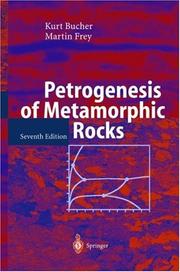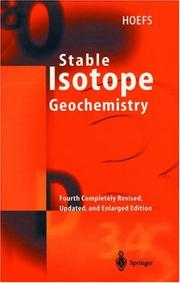| Listing 1 - 4 of 4 |
Sort by
|
Book
Abstract | Keywords | Export | Availability | Bookmark
 Loading...
Loading...Choose an application
- Reference Manager
- EndNote
- RefWorks (Direct export to RefWorks)
Geochemistry --- #KVIV --- Chemical composition of the earth --- Chemical geology --- Geological chemistry --- Geology, Chemical --- Chemistry --- Earth sciences --- Tables
Book
ISBN: 3510650743 Year: 1976 Publisher: Stuttgart : Schweizerbart,
Abstract | Keywords | Export | Availability | Bookmark
 Loading...
Loading...Choose an application
- Reference Manager
- EndNote
- RefWorks (Direct export to RefWorks)
Ore-deposits --- Geochemistry --- -Ore deposits --- -Deposits, Ore --- Mines and mineral resources --- Chemical composition of the earth --- Chemical geology --- Geological chemistry --- Geology, Chemical --- Chemistry --- Earth sciences --- Ore deposits --- -Geochemistry --- Deposits, Ore

ISBN: 3540431306 3662049163 3662049147 9783540431305 Year: 2002 Publisher: Berlin: Springer,
Abstract | Keywords | Export | Availability | Bookmark
 Loading...
Loading...Choose an application
- Reference Manager
- EndNote
- RefWorks (Direct export to RefWorks)
Metamorphic rocks make up the largest volume of the Earth. They systematically change their mineralogical composition as a result of tecto-thermal events. The outstanding feature of the 7th edition of this book is the large number of phase diagrams showing the stability relations among minerals and groups of minerals found in metamorphic rocks. The diagrams help to determine the pressure and temperature conditions under which a given collected set of metamorphic rocks may have formed. More than half of the chapters have been completely rewritten or revised. All figures have been edited and improved and recent advances in the field such as multiequilibria thermobarometry and pseudosections were incorporated in the text. The bibliography has been revised and extended, new research publications have been included. Brief reviews of relevant software and web addresses for downloads have also been integrated in this new edition. Graduate students will find in depth information on the origin, significance and genesis of metamorphic rocks.
Metamorphic rocks. --- Rocks, Metamorphic. --- Metamorphic rocks --- Rocks, Metamorphic --- Rocks --- Geology. --- Mineralogy. --- Geochemistry. --- Geophysics. --- Geography. --- Geophysics/Geodesy. --- Geography, general. --- Cosmography --- Earth sciences --- World history --- Geological physics --- Terrestrial physics --- Physics --- Chemical composition of the earth --- Chemical geology --- Geological chemistry --- Geology, Chemical --- Chemistry --- Physical geology --- Crystallography --- Minerals --- Geognosy --- Geoscience --- Natural history

ISBN: 3540611266 3662033798 3662033771 9783540611264 Year: 1997 Publisher: Berlin: Springer,
Abstract | Keywords | Export | Availability | Bookmark
 Loading...
Loading...Choose an application
- Reference Manager
- EndNote
- RefWorks (Direct export to RefWorks)
Stable Isotope Geochemistry, an introduction to the use of stable isotopes in the Earth Sciences, is subdivided into three parts: theoretical and experimental principles; fractionation mechanisms of light and heavy elements; and natural variations of geologically important reservoirs. Since publication of the 5th edition, substantial progress has been achieved in many subdisciplines of this field. Examples of these recent developments, which made a further revision necessary and are thus incorporated in the 6th edition, are: - Applications of Multicollector- ICP-MS have grown rapidly and now enable investigations of natural isotope variations of a wide range of transition and heavy elements that could not previously be measured with adequate precision; - Precise ion-probe measurements on the micrometer scale allow the detection of the growth and dissolution histories of minerals; - Evidence for mass-independent fractionation in a variety of compounds and elements has increased considerably; - High-precision analysis of the multiple rare isotopes of a specific element permit the distinction of different mass-dependent fractionation mechanisms; - Precise measurements of molecules containing more than one rare isotope indicate non-random distributions of the rare isotopes, which potentially may be utilized as one-mineral thermometers. This updated contemporary overview of the field continues to provide students, researchers, and practitioners with quick access to best practice, as well as the latest research and literature.
Geochemistry. --- Isotope geology. --- Géochimie --- Géologie isotopique --- Geochemistry --- Isotope geology --- 550.42 --- Occurrence and distribution of elements and their isotopes --- 550.42 Occurrence and distribution of elements and their isotopes --- Géochimie --- Géologie isotopique --- Isotope geochemistry --- Nuclear geochemistry --- Nuclear geology --- Nuclear geophysics --- Stable isotope geology --- Physical geology --- Chemical composition of the earth --- Chemical geology --- Geological chemistry --- Geology, Chemical --- Chemistry --- Earth sciences --- Mineralogy. --- Sedimentology. --- Geology. --- Mineral resources. --- Oceanography. --- Mineral Resources. --- Oceanography, Physical --- Oceanology --- Physical oceanography --- Thalassography --- Marine sciences --- Ocean --- Deposits, Mineral --- Mineral deposits --- Mineral resources --- Mines and mining --- Mining --- Natural resources --- Geology, Economic --- Minerals --- Geognosy --- Geoscience --- Natural history --- Petrology --- Crystallography --- Data processing.
| Listing 1 - 4 of 4 |
Sort by
|

 Search
Search Feedback
Feedback About UniCat
About UniCat  Help
Help News
News